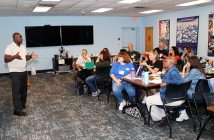Editor’s note: The contributions of CSEA’s shop stewards to our union are immeasurable. They communicate important union information, help address members’ concerns and serve as the face of our union at their respective work sites. The “Principal Steward” feature is an ongoing effort to highlight the dedication of these very important activists.
This month’s “Principal Steward” is Matt Ostrow, a cleaner at Levittown School District’s MacArthur High School and a member of Nassau Educational Employees Local 865.
Long Island Reporter (LIR): What made you decide to be a shop steward?
Matt Ostrow (MO): I ran the [internal]elections in my unit one year. Through that process, some of the officers saw that I put in a lot of effort and that I followed through on assignments. They suggested that I become a shop steward. I thought it sounded like a good idea. I knew I wanted to help, so I started to go to classes for the training. I’m not here to just hand out fliers; I want to make the members’ work environment better.
LIR: How long have you been a shop steward?
MO: For four and a half years.
LIR: What’s the most rewarding thing about being a shop steward?
MO: Being able to help the members and get them answers that they might otherwise not get. Sometimes, information we’re receiving isn’t clear to everyone. We have to figure things out in order to explain things to people effectively. I like being able to defend members when someone comes against them. When I get a good outcome, it makes me very happy because I get to see that the work that I’m doing for them is making a difference.
LIR: What’s the most challenging thing about your position?
MO: Not being able to give people an answer in what I believe is a timely manner. I prefer to get back to the person quickly, after I do whatever research that I need to do or go find the right person to get the answer from. Sometimes, it’s not that easy. There’s been times that I had to call a peer or call [CSEA headquarters] to try to get some answers and that can take time.
LIR: At least you got the answers.
MO: I learned to do that from when I worked on the elections. It was the first time that I had ever worked on an election, so I had to make a lot of calls upstate to get some clarity.
LIR: What’s the most common question that you get asked?
MO: It always has something to do with the contract, raises or thoughts on adding something to the contract. Those are the hardest questions to answer because I’m not working with negotiations, and most of the negotiations aren’t allowed to be commented on by those involved. That information is confidential and I tell them that they have to wait.
LIR: How do they respond to being told to wait?
MO: Sometimes, the person will ask me the same question on a regular basis. I just tell them that it’s being worked on and when the time comes that the answers can be given, I will have them. I assure them that I’m passing along their concerns and desires to those who are working on the issue.
LIR: What’s your relationship like with the people at your work site?
MO: I have a good working rapport with everyone. I’m one of four shop stewards in the building. We try to pass around information that we get to each other so we all have it to post and give out. If one of goes to a meeting, that person makes sure the others are aware of what went on. That way, if someone asks us a question about what went on at the meeting, all of us can give an answer.
LIR: Do you think that it’s important that all of the shop stewards at your work site get along?
MO: It goes beyond just being a shop steward. When you’re in the work environment, you have to be able to get along with everyone you’re around, to some extent. You have to have a good work environment to do the job that you need to do. You’re only as good as everybody else that you’re with. If you’re always in a bad mood or if you treat people poorly, the people around you will mimic your behavior. To me, the main thing is to always try to be positive, try to smile as much as you can and just have a good disposition.
LIR: Did you have a mentor?
MO: [Levittown School District Unit 1st Vice President] Mike Gunn. He has helped me along and guided me with everything that I needed. He let me know the people I needed to contact or books that I needed to read when I had an issue.
LIR: What did you think of the shop steward classes?
MO: I enjoyed them. They gave an overview of what we need to do and places we need to go for information. I liked that the classes are interactive, which is good because you’re not always going to know the people that you need to help. So, by working with strangers in classes, it gives you the confidence to work with the people at your work site who you may not know. Getting involved in scenarios also makes you open up a little bit.
LIR: What advice would you give to a potential shop steward?
MO: If you really have the desire to help people and you’re willing to put in the time to follow through with steward related tasks, definitely approach someone about getting involved. Even if you don’t know all of the rules of the contract, there are enough people around who can guide you through the process.
LIR: What do you want people to know about being a shop steward?
MO: Sometimes, your efforts take up a lot of time, but it’s worth it because the work is so fulfilling and you know that you’re able to help people. You’re actually affecting people’s lives and their livelihoods.




